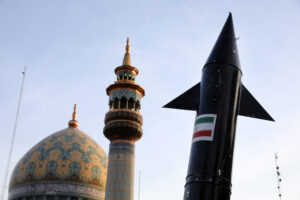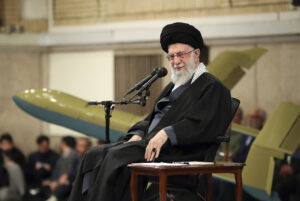In Rare Attacks in Iran, Terrorists Storm Parliament and Shrine; Islamic State Claims Responsibility
Gunfire and suicide explosions kill at least 12 and wound about 30 in Tehran. (Pictured, the Iranian Parliament.)
By Paul Schemm and Brian Murphy / Washington Post
Gunmen stormed two major sites in Iran’s capital Wednesday, killing at least 12 people in gunfire and suicide blasts in parliament and at the revered tomb of the nation’s Islamic revolution leader. The Islamic State claimed responsibility for the Tehran attacks, which would mark the group’s first major strikes in Iran.
State-run broadcaster IRIB reported the twin attacks killed at least 12 people were killed in an hours-long standoff that ended with all four attackers being killed by security forces.
Earlier, state news agency IRNA said the dead included at least two security guards and that about 30 people were wounded.
The Islamic State group’s media arm Amaq claimed the militant group carried out the twin attacks. The Islamic State, however, is often quick to take ownership of spectacular assaults without providing any evidence.
Iran is predominantly Shiite Muslim and is at odds with Sunni extremist groups such as al-Qaida and the Islamic State, which view Shiites as a deviant brand of Islam and have carried out attacks against Shiite targets and Iranian religious pilgrims in Iraq and elsewhere across the region
Shiite factions backed by Iran, meanwhile, have joined battles against the Islamic State in Iraq and aid the government of Syrian President Bashar Assad in Syria.
Despite the years of tensions between Iran and the Islamic State, the purported terrorist blow in Tehran would signify a serious escalation by the militants in the region after claiming a wave of attacks in Europe.
For Iran, it also sharply raises the stakes because of the importance of both sites.
Iran views its parliament, or majlis, as a symbol of participatory government in contrast to its main regional rivals, including Saudi Arabia and its Gulf Arab allies. The expansive complex around the tomb of Ayatollah Ruhollah Khomeini is both a spiritual and political testament to the 1979 Islamic revolution.
The huge courtyard and buildings, including blue tile domes flaking the mausoleum, are particularly filled with visitors during the holy month of Ramadan, which began two weeks ago.
Attacks of this kind are a rarity in the heart of Iran’s capital, where security forces are deployed at prominent sites. The parliament building, with a green marble chamber for lawmakers, is in the center of the city, and the tomb complex for Khomeini is about 12 miles to the south near the international airport.
“Some coward terrorists infiltrated a building in the Majlis, but they were seriously confronted,” parliament’s speaker, Ali Larijani, told IRNA. “This is a minor issue but reveals that the terrorists pursue troublemaking.”
Iranian intelligence, meanwhile, said they had foiled a third attack and arrested a team, according to the state broadcaster. The statement from the Islamic State did not mention a third attack.
Ali Khalili of the Khomeini Mausoleum told IRNA that there were at least three, possibly four, attackers who opened fire on the tomb, and one of them detonated himself at the entrance.
Lawmaker Qolam-Ali Jafarzadeh Imenabadi, meanwhile, put the number of attackers at the parliament at four and said they were armed with Kalashnikov assault rifles.
One of the attackers at the parliament was arrested, added the news agency and another blew himself up with a suicide vest.
Iran has suffered from terrorist attacks in the past, but rarely in the cities or the capital. Separatist groups and Sunni extremist movements have carried out bombings in the border region near Pakistan in the past, including a suicide attack on a mosque in 2010 that killed 39.
The violence in Tehran added to swelling sense of bedlam and instability across the Persian Gulf region. In addition to the civil war raging in Yemen and the ongoing war in Iraq against the Islamic State militant group, Saudi Arabia and other Arab nations announced this week they were severing virtually all ties with the government of Qatar because of what they said was Qatar’s support for terrorist groups.
The extraordinary rift between the Saudi-led bloc and Qatar showed the degree to which Iran’s increasingly muscular role in the region – including its intervention in Syria’s civil war – has stirred fury among its Arab rivals. Saudi Arabia and its Sunni allies, including Bahrain and the United Arab Emirates, have expressed growing anger at Qatar’s relatively cordial relations with Shiite Iran.
—
Murphy reported from Washington. The Washington Post’s Kareem Fahim in Istanbul contributed to this report.
Your support matters…Independent journalism is under threat and overshadowed by heavily funded mainstream media.
You can help level the playing field. Become a member.
Your tax-deductible contribution keeps us digging beneath the headlines to give you thought-provoking, investigative reporting and analysis that unearths what's really happening- without compromise.
Give today to support our courageous, independent journalists.






You need to be a supporter to comment.
There are currently no responses to this article.
Be the first to respond.